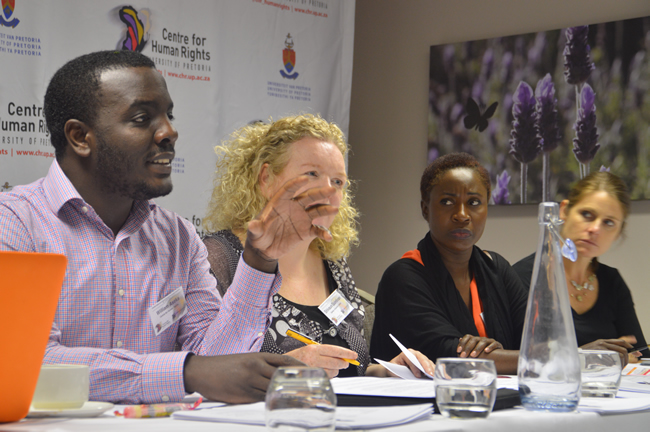The Open Society Foundations (OSF) in collaboration with the Centre for Human Rights (CHR) launched the Disability Rights Scholarship Programme (DRSP) in 2011. The CHR through the Disability Rights Unit has played a significant role of coordinating the DRSP which has included: marketing the programme, receiving applications, shortlisting semi-finalists and hosting the interviews of the shortlisted semi-finalists.
In 2016 the Open Society Foundation as the funder of the DRSP extended its funding and introduced for the first time an Inclusive Education Scholarship Programme (IESP), also in collaboration with the CHR.
DRSP and IESP are open to disability rights advocates, lawyers, and educators who are interested in the development of new legislation, jurisprudence, policy and research that will harness the innovations and opportunities offered by the domestication of the United Nations Convention on the Rights of Persons with Disabilities (CRPD). For the 2017 programme those applying for the programmes had to be citizens of Mozambique, Kenya, Malawi, Sudan, South Sudan, Tanzania, Tunisia, or Uganda at the time of application.
With very limited number of places reserved for the semi-finalists interviews, the shortlisting panel had to make tough and difficult calls to leave out good applications for the few places that were reserved for the interviews.
Following the short-listing of the semi-finalists, the CHR through the Disability Rights Unit hosted the interviews for the shortlisted semi-finalists from 10 to 12 April 2017.
The interview panel for the semi-finalists was composed of members of disability rights and inclusive education academic institutions in Europe, United States of America, Canada and the Open Society Foundation who are the funders of the Scholarship. The interview process has given the Disability Rights Unit over the years, an opportunity to engage with different insights gained from the members of interview panel, this year was not different. These insights have assisted the Disability Rights Unit to identify the best way to better the work that Unit is doing in the continent in the area of rights of persons with disabilities. Also through the Unit’s engagements with the semi-finalists during the interview the Unit have been able to identify some of the most critical issues, challenges, gaps and inadequacies in the field as well as potential areas of interests that could form part of the Unit’s future work and collaboration.
After the interviews were done, the semi-finalists had an opportunity to mingle with the Unit and the members of the interview panel at the reception function. The reception was a great opportunity to engage with the semi-finalists on a more personal and non-stressful level which gave the Unit an opportunity to draw out from the semi-finalists what the interview process meant to them. Harriet from Uganda had this to say: “I was able to interact with and forge friendships with like-minded applicants from countries as diverse as Tunisia, Malawi and Tanzania”, Peter from Kenya: “To me this interview was a very important stage to determine not only my eligibility for the scholarship but my ability to contribute to the promotion of persons with disabilities rights after the course. This meant that the scholarship was merit based, not disability or country based.” Emmanuel from Tanzania had this to say: “It was in deed a wonderful exposure and a remarkable event ever experienced throughout my entire life. I was personally enlightened, encouraged and strengthened in many areas of my career”. Last but not least Faith from Kenya reported: “The accommodations made while attending the interviews reminded me of the beauty of inclusion, in the opportunity to travel and participate without being reminded of my difference”.
Looking at the 49 scholars and disability rights champions the scholarship has produced from the African continent in the last 6 years, the Unit is confident that this year’s finalists will not disappoint when they finally take their place.
The successful finalists will be sent to selected academic institutions that have demonstrated cutting-edge capacity for legal education in international disability rights.
These institutions are:
- National University of Ireland, Galway, Ireland
- McGill University, Canada
- University of Leeds, UK
- Syracuse University, USA
- American University, USA
For more information on the programme kindly contact Jehoshaphat Njau at Jehoshaphat.njau@up.ac.za


